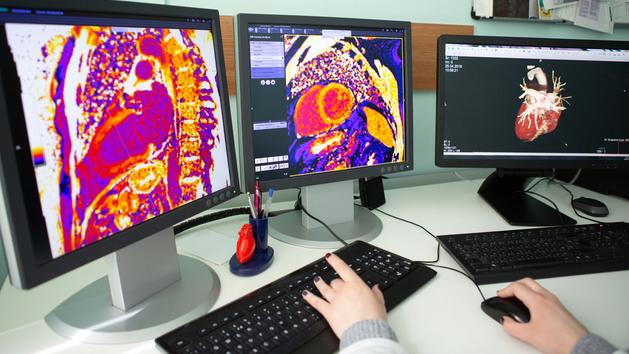The Covid-19 epidemic is not over as specialists are already worried about the potential consequences of the disease on the body. In a July 15 press release, the National Academy of Medicine invited, for example, vigilance and the creation of a cohort for a longitudinal study of several years on the subject.
Read also: Covid-19 and pulmonary sequelae: "We fear the appearance of a new disease"
Last week is a German study published in the journal Jama Cardiologywhich, for its part, warned about the risk of complications in the heart. Doctors at the University Hospital in Frankfurt performed an MRI on a cohort of 100 recently recovered Covid-19 patients two to three months after the diagnosis was confirmed by a PCR test. Result, 78% presented abnormal results. Researchers report inflammation of the heart muscle (myocardium) in 60 patients and / or the pericardium, the envelope surrounding the heart, in 22 others. Depending on the case, this is still active inflammation or scars. More surprisingly, these results are not correlated with the severity of the disease. Only two patients in the cohort were admitted to intensive care following their contamination with Covid-19, and 31 were hospitalized. The other patients suffered from a rather mild form.
“This kind of image is usually associated with a greater risk of cardiac dysfunction and the appearance of long-term cardiac insufficiency, analyzes Florian Zores , cardiologist in Strasbourg. These results raise real questions about the long-term risk of cardiomyopathies and heart failure. Unfortunately, the authors do not give us a table comparing the characteristics of patients with anomalies and without anomalies. This would have made it possible to think upstream to which patients to offer an MRI. ” Note that this is not a clinical study: scientists have not monitored the appearance of cardiac symptoms in a representative sample.
When the nervous system malfunctions like this, learning to breathe again, to adapt your heart rate properly, is not trivial.
Dr Benjamin Davido, infectious disease specialist at Raymond-Poincaré hospital in Garches“The study included volunteers who presented symptoms (17% chest pain, 20% palpitations, 35% shortness of breath)”, explains Florian Zores. These results do not therefore mean that 78% of Covid-19 patients will experience heart problems afterwards. "Myocarditis and pericarditis are not rare," adds Benjamin Davido, infectious disease specialist at Raymond-Poincaré hospital in Garches. “Classically, myopericarditis are also viral diseases (for 90% of them). It is not surprising to find it in former patients with Covid. However, these results are very interesting, as they confirm that the virus has a particular affinity for blood vessels , which is cleverly called the vascular endothelium. This proves that these patients considered to be cured and who come to see us in consultation with fatigue or shortness of breath problems do not somatize. ”
Need for an effective post-Covid monitoring system
In an article published on July 23 in the journal Clinical Microbiology and Infection, the doctor described with his colleagues at the Hospitals of Paris a number of persistent symptoms caused by Covid-19 in AP-HP patients. “We notice that there is a very strong propensity to dysautonomia, namely a dysfunction of the autonomic nervous system. It no longer manages to perform such simple and vital functions such as breathing or adapting the heart rate to effort. Our hypothesis is that the small blood vessels have in fact been damaged by the virus and are no longer fulfilling their role of supplying the nervous system properly. "
Read also: Covid-19: symptoms, sequelae ... When the disease does not end
This problem is all the more pernicious as it can persist after the virus has disappeared. “We are no longer faced with an infectious disease,” summarizes Dr. Benjamin Davido. The virus is no longer present in the body. But the damaged ships have not been repaired. Which would explain why the symptoms persist. ” Like the Academy of Medicine, the infectious disease specialist therefore insists on the need to set up an effective post-Covid monitoring system. According to Benjamin Davido, these complications should not however be irreversible, provided rehabilitation is provided. “When the nervous system malfunctions like this, learning to breathe again, to adapt your heart rate well, is not trivial. It takes practice. Like a marathon, in a way. It's always possible, but you have to go gradually. ”





